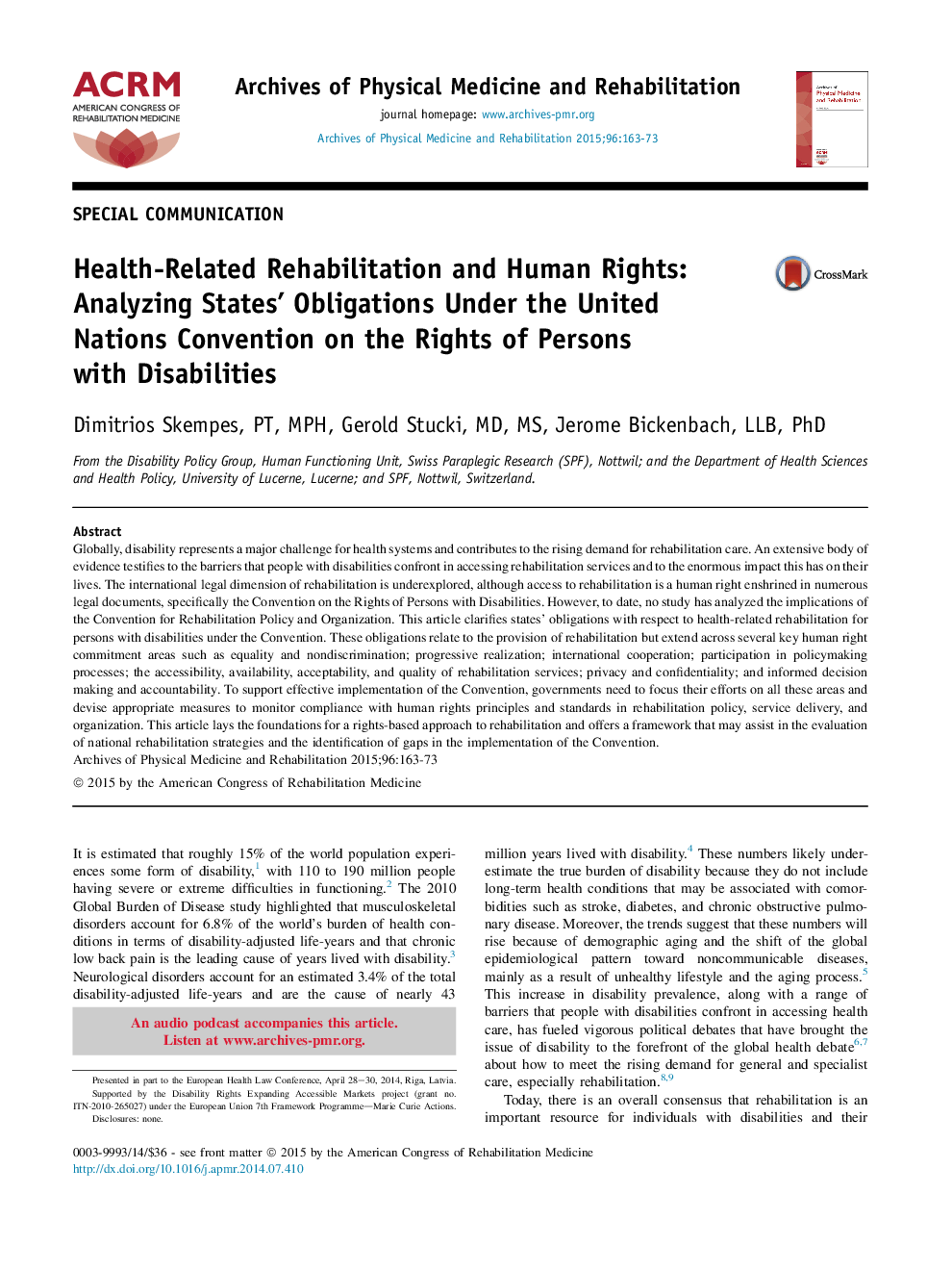| کد مقاله | کد نشریه | سال انتشار | مقاله انگلیسی | نسخه تمام متن |
|---|---|---|---|---|
| 6149673 | 1595689 | 2015 | 11 صفحه PDF | دانلود رایگان |
عنوان انگلیسی مقاله ISI
Health-Related Rehabilitation and Human Rights: Analyzing States' Obligations Under the United Nations Convention on the Rights of Persons with Disabilities
ترجمه فارسی عنوان
توانبخشی مربوط به بهداشت و حقوق بشر: تجزیه و تحلیل وظایف کشورها تحت کنوانسیون سازمان ملل متحد در زمینه حقوق افراد دارای معلولیت
دانلود مقاله + سفارش ترجمه
دانلود مقاله ISI انگلیسی
رایگان برای ایرانیان
کلمات کلیدی
ترجمه چکیده
در سطح جهانی، ناتوانی یک چالش عمده برای سیستم های بهداشتی است و به افزایش تقاضای مراقبت های توانبخشی کمک می کند. شواهد گسترده ای از شواهد نشان می دهد موانعی که افراد معلول در دسترسی به خدمات توانبخشی و تاثیرات آن بر زندگی آنها مواجه هستند. ابعاد قانونی بین المللی در زمینه توانبخشی در حال کاهش است، اگر چه دسترسی به توانبخشی یک قانون انسانی است که در مدارک قانونی متعددی، به ویژه کنوانسیون حقوق افراد معلول، تثبیت شده است. با این حال، تا به امروز، هیچ مطالعهای پیامدهای کنوانسیون سیاست و سازماندهی توانبخشی را تحلیل نمیکند. این مقاله، تعهدات ایالتی را در رابطه با توانبخشی مربوط به سلامت برای افراد معلول تحت شرایط کنوانسیون، روشن می کند. این تعهدات مربوط به تدارک توانبخشی است، اما در چندین زمینه تعهد کلیدی حقوق بشر مانند برابری و عدم تبعیض، گسترش می یابد؛ تحقق پیشرفت؛ همکاری بین المللی؛ مشارکت در فرایندهای سیاستگذاری؛ دسترسی، در دسترس بودن، پذیرش و کیفیت خدمات توانبخشی؛ حریم خصوصی و محرمانه بودن و تصمیم گیری و پاسخگویی آگاهانه. برای حمایت از اجرای مؤثر کنوانسیون، دولت ها باید تلاش های خود را بر روی تمام این مناطق تمرکز کنند و اقدامات لازم را برای نظارت بر انطباق با اصول و استانداردهای حقوق بشر در سیاست های توانبخشی، ارائه خدمات و سازمان انجام دهند. این مقاله پایه های یک رویکرد مبتنی بر حقوق را برای توانبخشی فراهم می کند و چارچوبی را ارائه می دهد که می تواند در ارزیابی استراتژی های توانبخشی ملی و شناسایی شکاف در اجرای کنوانسیون کمک کند.
موضوعات مرتبط
علوم پزشکی و سلامت
پزشکی و دندانپزشکی
پزشکی و دندانپزشکی (عمومی)
چکیده انگلیسی
Globally, disability represents a major challenge for health systems and contributes to the rising demand for rehabilitation care. An extensive body of evidence testifies to the barriers that people with disabilities confront in accessing rehabilitation services and to the enormous impact this has on their lives. The international legal dimension of rehabilitation is underexplored, although access to rehabilitation is a human right enshrined in numerous legal documents, specifically the Convention on the Rights of Persons with Disabilities. However, to date, no study has analyzed the implications of the Convention for Rehabilitation Policy and Organization. This article clarifies states' obligations with respect to health-related rehabilitation for persons with disabilities under the Convention. These obligations relate to the provision of rehabilitation but extend across several key human right commitment areas such as equality and nondiscrimination; progressive realization; international cooperation; participation in policymaking processes; the accessibility, availability, acceptability, and quality of rehabilitation services; privacy and confidentiality; and informed decision making and accountability. To support effective implementation of the Convention, governments need to focus their efforts on all these areas and devise appropriate measures to monitor compliance with human rights principles and standards in rehabilitation policy, service delivery, and organization. This article lays the foundations for a rights-based approach to rehabilitation and offers a framework that may assist in the evaluation of national rehabilitation strategies and the identification of gaps in the implementation of the Convention.
ناشر
Database: Elsevier - ScienceDirect (ساینس دایرکت)
Journal: Archives of Physical Medicine and Rehabilitation - Volume 96, Issue 1, January 2015, Pages 163-173
Journal: Archives of Physical Medicine and Rehabilitation - Volume 96, Issue 1, January 2015, Pages 163-173
نویسندگان
Dimitrios PT, MPH, Gerold MD, MS, Jerome LLB, PhD,
